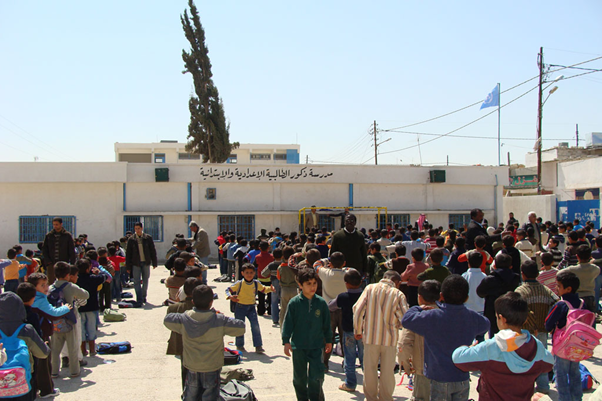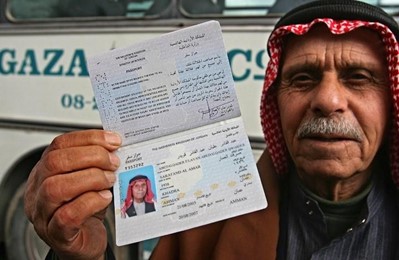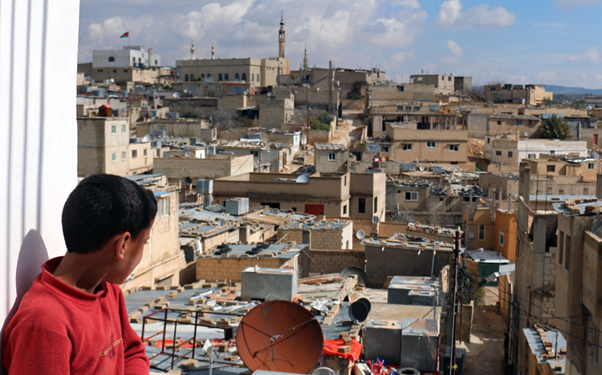The fact that the Jews established their own political body after living as “nomads” or “homeless” from the “first exile” until the middle of the last century led to the dispersal of Palestinians across the globe as disembodied bodies. Especially after the Nakba (1948) and the Six-Day War (Naksa, 1967), Palestinians have been scattered as refugees everywhere, especially in neighboring countries, but mainly in Jordan. There are undoubtedly many historical and political reasons, but we will not dwell on them for now. Instead, we will focus on the problem of education for Palestinian refugees living in Jordan and how it reproduces inequalities in reference to Pierre Bourdieu’s theories on the relationship between inequality and education. However, as we will analyze, not only education but also living in or outside the camp, citizenship, and identity politics play significant roles in reproducing these inequalities. In other words, we will see that in addition to its function of reproducing existing inequality, education is a result of these secondary conditions.
Today, a significant portion of Palestinians living in Jordan reside in major cities, primarily Amman, outside the settlements officially designated as “camps.” However, a considerable number (around 450,000) still live in ten settlements[1] classified as “camps” for various reasons. According to UNRWA, there are currently a total of 2,307,011 registered Palestinian refugees in Jordan. Considering Jordan’s current population is around 11 million, this constitutes a significant proportion. So, what is the level of social participation among this population? This can be better answered when we consider access to education.
Forms of Inequality in Refugee Status
According to the latest data from UNRWA[2], 121,000 Palestinian refugee students in grades 1 through 10 across Jordan receive education in shifts under the supervision of 3,902 teachers in 169 schools located in the mentioned ten official camps. This is not the same as the Turkish practice of having different groups of students studying in the same school as morning and afternoon classes; rather, it is a system in which two or three different schools use the same building in shifts. Firstly, the physical capacities of the camps are not suitable for constructing an adequate number of independent school buildings. Since the land allocated when they were first established has remained the same despite the increasing population, the problem is being solved with multi-story buildings, which are often illegal but tolerated. As UNRWA’s reports show, buildings are often rented as schools, even though the infrastructure is not very suitable. Consequently, most schools share the same building in rotation, sometimes with two or even three different schools using it alternately. This initial inequality manifests itself in the physical realm.

The Talbieh Elementary/Preparatory Boys’ School in Talbieh camp
Source: Nidal Ammouri, UNRWA Photo
The second form of inequality also revolves around the camps. Firstly, there exists a “natural” stratification between the camps and areas outside the camps because of the inadequacies of the camps themselves. Additionally, there is a hierarchy among the camps. For instance, the camps established after the Naksa (1967) have much poorer infrastructure, employment opportunities, and social standards than those established after the Nakba (1948), which determines social integration and, consequently, the quality of education. In a situation where the almost sole gateway to leaving the camps is “economic capital,” conditions that hinder access to this capital are reproduced alongside policies accompanying them. Thus, the camps become places of “fate.” Those who have the ability to create practices to escape this fate, when they leave the camps, become spectators to the darker fate of those left behind. They contribute to shaping a camp demographic that becomes increasingly impoverished, unemployed, uneducated, unhealthy, and prone to crime. Therefore, although students in the camps are subject to the same curriculum, this “natural” stratification not only determines the general student profile but also influences the quality of education provided.S Students in the camps must exert more effort to compete with those outside because they are responsible for attending classes and contributing to their families’ livelihoods (Günenç & Karadeniz, 2015). An extension of this stratification between the inside and outside of the camps also occurs between Palestinians and Jordanians. A statement by a Palestinian refugee youth summarizes the second form of stratification: “We are worker-students, while Jordanians are just students.” Ultimately, everyone becomes involved in this competition with all forms of capital they possess or lack.
Although students in the camps are subject to the same curriculum, this “natural” stratification not only determines the general student profile but also influences the quality of education provided.
Another form of inequality, of course, is related to who can study where and under what conditions, which is interconnected with the previous ones. For example, on page 28 of UNICEF’s 2020 Jordan Country Report on Out-of-School Children[3], it is stated that “Higher education is not free. The tuition fee payable depends on the nationality of the student.” This statement seems to indicate a very ordinary situation and may not be seen as a practice that anyone would find strange. After all, it is expected that each country would prioritize its own citizens in such a differentiation. However, the implications are different when it comes to the status of Palestinians in Jordan due to the variation in their refugee status after each war. The education system itself functions as an elimination mechanism from the very beginning. While Palestinian refugees provided with citizenship by UNRWA can enter university for free or at lower tuition fees, the majority residing in Marka and Jerash camps, mainly Gazans, cannot benefit from this right because they are not citizens (Özcan & Şenses, 2022). Therefore, Gazans are kept as hostages in a “permanent/permanently temporary” status in Jordan by not being included in the citizenship class and not being allowed to integrate into existing social structures in any way.
The “Refugees” of the Refugees: Palestinians
The way in which the fundamental rights regulating citizenship based on identity are implemented in Jordan not only creates a distinction between Palestinians and native Jordanians as citizens but also among Palestinians themselves, turning some into the “refugees” of refugees. Gazans are taken out of the equation through citizenship rights and are often denied opportunities for upward mobility, which are instead reserved for citizens. If you happen to be a Palestinian who has managed to obtain citizenship and perhaps a university education, you must wait a few years to find a job; however, as a Jordanian native, you may not have to wait at all by using wasta (relationships of patronage). If you are a Palestinian looking for a job in Jordan, you must work much harder than Jordanians, but even when you start working, you are almost barred from advancing beyond a certain point; for example, if you work as a police officer, you cannot rise to the rank of a senior commander (Achilli, 2015). hus, Palestinians can be teachers but cannot be principals; they can be police officers but cannot be directors; they can even be prime ministers but cannot have the “true” Jordanian passport.[4] Citizens who are included in the economy and pay taxes but still maintain refugee status are kept in a zone of uncertainty, away from areas where the functioning of the state is thin, and they could intervene in that of the state. Citizenship, which leads to identity being dragged into the zone of uncertainty, along with the existence of identity components such as relative channels for upward mobility, can be seen as a situation specific to Jordan (Karadeniz, 2018).

A Palestinian refugee, Abed Alqader Qwaider, shows his temporary Jordanian passport.
Source: Abid Katib, Getty Images
Jordan certainly has its justifications behind the policies outlined here; in fact, some Palestinians we talked to in camps or outside even believe (or let’s say, they interpret it with good intentions) that these policies aim to prevent Palestinians from losing their identities and their right of return. We don’t know if this is really the intention behind these policies. However, when we look at the results, we must acknowledge that this is indeed happening. There are significant differences in the tone of Palestinian identity and motivation for return between inside and outside the camps. Living in a camp and being a refugee are closely associated with Palestinian identity. This can also be observed in the interactions in these camps, as seen in the fieldwork conducted by Ferhat Gökdağ in 2016.[5] Palestinians living outside the camps, who receive a good education, experience increasing levels of prosperity, and can somewhat blend in with Jordanians, show a significant decrease in their emotional investments and sense of belonging to Palestine. Hence, the policies and practices that exclude Palestinians from education, employment, social, and cultural life remind them that they are always refugees and temporary residents and must return one day, thus continuously reproducing their refugee status. Even merely characterizing where they live as a “camp” plays a significant role in this reproduction.
There are significant differences in the tone of Palestinian identity and motivation for return between inside and outside the camps.
To summarize, firstly, we must acknowledge that the education system itself continues to formally produce and reproduce refugees through the distinction between citizens and non-citizens, those who live in camps and those who do not. Secondly, regardless of its physical conditions, labeling a space as a “camp” establishes the codes for reproducing refugee status; living there, regardless of the conditions, defines one as a refugee. Thirdly, Jordan’s government policies on citizenship and refugee status produce a kind of “the refugees of refugees” by hierarchically organizing Palestinians within themselves and layering refugee status through distinctions made between those living in camps or outside and those who are granted or denied citizenship. Lastly, by marking the passports and identity documents of those who have been granted citizenship, it creates the groundwork for sustaining inequality. Thus, by first creating spatial and status-based distinctions among Palestinians and then establishing a second level where Palestinians and Jordanians can be distinguished, it ensures the reproduction of inequalities.
References
Achilli, L. (2015). Becoming a man in al-Wihdat: Masculine performances in a Palestinian refugee camp in Jordan. International Journal of Middle East Studies, 47, 263-280.
Günenç, Ö. F. & Karadeniz, S. (2015). Eğitim ve kentlilik: Filistin mülteci kampları. B. Akgün, S. El Fakih, A. Uysal ve M. Şahin (Ed.) In IV. Arap-Türk sosyal bilimler kongresi eğitim ekonomi kalkınma. Istanbul: SDE Publishing.
Karadeniz, S. (2018). Kamp kimlik ve biyosiyaset, Istanbul: Çizgi Publishing.
Özcan, K. & Şenses, N. (2022). Ürdün’deki Filistinliler: Göçler, statüler ve haklar. Turkish Journal of Middle Eastern Studies, 9(2), 15-56.
[1] Amman New Camp (Wihdat), Baqa’a, Husn, Irbid, Jabal el-Hussein, Jerash, Marka, Souf, Talbieh, Zarqa.
[2] The most recent data provided by UNRWA is for 2019-2020. See https://www.unrwa.org/activity/education-jordan. For other data, see https://pirls2021.org/wp-content/uploads/2022/10/Jordan.pdf. For an overview of the education system of Jordan, see https://www.epdc.org/sites/default/files/documents/EPDC_NEP_2018_Jordan.pdf
[3] https://www.unicef.org/jordan/media/5501/file/OSC-Report-EN.pdf
[4] To preserve the “true” Jordanian identity and thus to make the distinction between Palestinians and “original” Jordanians clearer/visible, the Jordanian state uses different symbols on their passports: Palestinians have a P (Palestinian), while Jordanians have a J (Jordanian). Hence, being stamped with “refugee” is not limited to camps or camp conditions; even being a citizen does not prevent a Palestinian from being labeled as a “refugee.”
[5] Ferhat Gökdağ spent part of 2023 conducting fieldwork for his thesis titled “Ürdün’deki Filistinli Mültecilerin Kudüs Algısı: El-Hüseyin ve Beka Kampları Örneği” in the mentioned camps.
Photograph: Jerash Camp
Source: Ahmad Abu Sitteh, UNRWA Photo












































